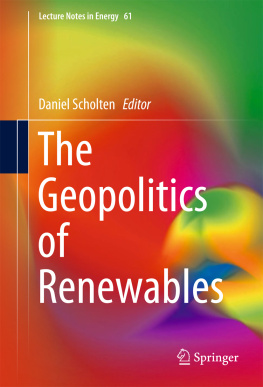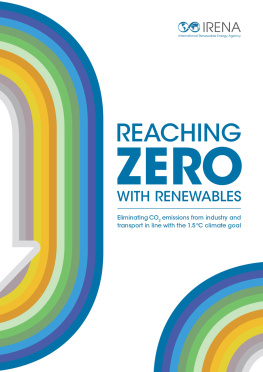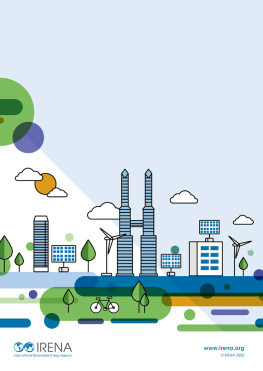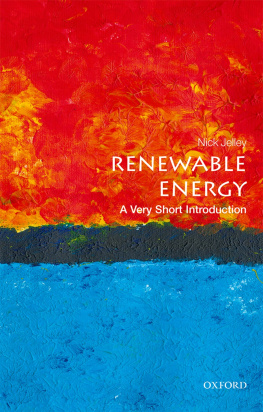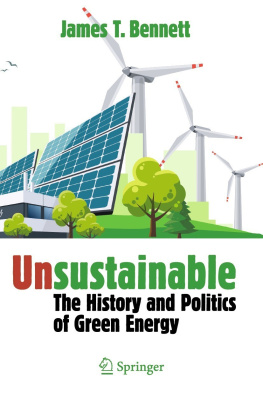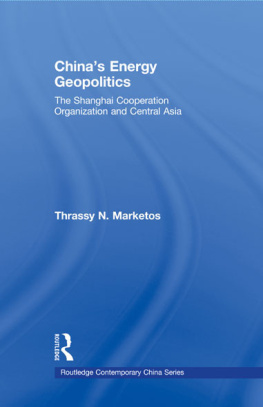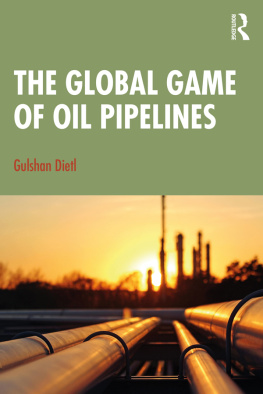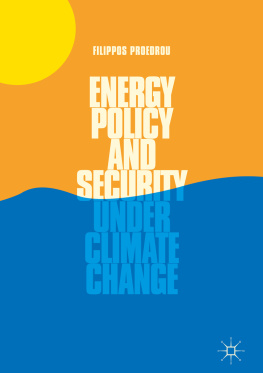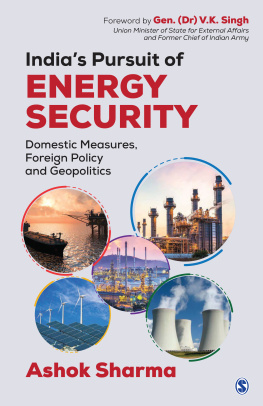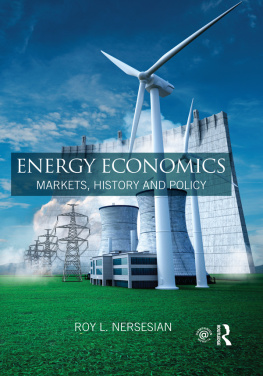1. The Geopolitics of RenewablesAn Introduction and Expectations
1.1 Introduction
Renewable energy represents a game changer for interstate energy relations . Its geographic and technical characteristics are fundamentally different from those of coal , oil , and natural gas . Renewable energy sources are abundant and intermittent; renewable energy production lends itself more to decentral generation and involves rare earth materials in clean tech equipment; their distribution , finally, is mostly electric in nature and involves stringent managerial conditions and long-distance losses. These stand in clear contrast to the geographically fixed and finite nature of fossil fuel resources, their general reliance on large centralized production and processing installations, and their ease of storage and transportation as solids, liquids, or gases around the globe. As the characteristics of fossil fuels have shaped contemporary energy -related patterns of cooperation and conflict among countries, the question rises how the transition towards renewables will reshape strategic realities and policy considerations of energy producers , consumers , and transit countries and relations between them. Moreover, who are the likely winners and losers?
Energy geopolitics is generally associated with fossil fuels, especially oil and natural gas. The focus on fossil fuels stems from their dominance in the global energy mix. Coal, oil, and natural gas combined account for 86% of global energy consumption in 2014 (BP ). Moreover, even though reserves are depleting, global demand is still growing for fossil fuels in general. In short, the importance of coal, oil, and natural gas in global trade can hardly be overstated nor can their key role in fueling industrial processes and modern economies be denied.
The special preoccupation of energy geopolitics with oil and natural gas can be attributed to the specific geographic and technical characteristics of oil and gas systems that have shaped the particular (politicized) nature of contemporary interstate energy relations. Energy production and refinement takes place in large, i.e. high capacity , centralized facilities (that are dependent on constant input but produce a stable output) near oil and gas fields or in facilities closer to demand centers; business models are dominated by economies of scale, making national and multinational companies the key players. The physical infrastructure is characterized by many transport modalities (pipelines, tankers, rail, road) and efficient storage options (depots, cylinders), making for an easily manageable whole of physically separable components. Moreover, oil and gas are well-suited for long-distance (global) trade as there is negligible loss of energy content. Current strategic realities and policy considerations are clearly shaped by these characteristics. Energy geopolitics is generally regarded to revolve around depleting and geographically concentrated oil and gas reserves in politically unstable countries in the Middle East and North-Africa (MENA) and Central Asia and Caspian Region (CACR). The unequal geographic distribution creates a clear separation between net-exporters and net-importers , setting up oligopolistic markets where producers such as Russia and the OPEC countries hold considerable market power and try to keep prices up and where consumers follow policies of diversification of source, origin, and route to secure access to (cheap) resources. Naval trade routes and pipeline politics play a crucial role for net-importers such as the US, EU, China , Japan , and India in securing supply from across the globe as do strategic reserves to limit vulnerability to transport bottlenecks and the effects of accidents and cut-offs . The oligopolistic setting is somewhat tempered due to net-exporters economic dependence on oil and gas rents and net-importers dominance in global political affairs and their sheer market size. The energy game is furthermore characterized by big (multi)national oil and gas companies that hold key generation and distribution know-how and assets (refineries, storage hubs, harbor facilities, etc.), environmental degradation and harmful emissions due to fossil fuel use, and the concept of peak oil . Until recently, oil companies and net-exporters were planning to exploit ever more unconventional oil and gas deposits in the assurance that prices would slowly rise over time due to growing demand and decreasing stocks. In all, energy relations are viewed as zero-sum and inherently conflict prone.
The increasing use of renewable energy sources slowly but surely erodes the dominance of fossil fuels. Whether due to climate change concerns, stock depletion , or for reasons of diversification away from oil and gas, renewable energy use is growing, generally outpacing fossil fuels (NREL ).
This transition towards renewable energy represents a game changer for interstate energy relations . The geographic and technical characteristics of renewable energy systems differ greatly from those of coal , oil , and natural gas systems. Renewable energy sources are abundant and intermittent; renewable energy production lends itself more to decentral generation and involves rare earth materials in clean tech equipment; their distribution , finally, is mostly electric in nature and involves stringent managerial conditions and long-distance losses. As the share of renewables in the global energy mix grows, so too will their characteristics increasingly shape energy geopolitics.
The geographical and technical characteristics of renewable energy systems have given rise to a number of expectations ). First, a shift from oligopolistic to more competitive markets due to the abundance of renewable energy sources . As most countries possess some form of renewable energy , countries essentially face a make-or-buy decision and are no longer completely dependent on overseas reserves . While political entanglements in the MENA and CACR are likely to become less, access to geographically bound renewables and availability at the right time due to renewables intermittent nature are set to become new concerns. Second, we may expect an increasingly decentralized nature of energy production by and for a more varied set of local actors, enabling new business models and local empowerment. Third, increasing competition for rare earth materials and clean tech know-how between countries that aspire to be industrial leaders in renewable generation technology is highly likely. Another expectation is the electrification of energy systems , as electricity is the energy carrier of most renewables. The likely implications of this are a regionalization of energy relations because of long-distance losses and a strategic emphasis on continuity of service supply instead of commodity supply due to renewables abundance and stringent managerial conditions.
Contemporary developments show some indication that we are heading in the direction of these expectations. We can already observe, for example, that net-importers use domestically available renewables as sources of diversification , eroding the market power of oil and gas exporters , who for their part worry about stranded assets . We can also see how countries like the US, Germany , and China compete for industrial leadership in renewable energy generation technologies and that they investigate access to rare earth materials as a potential bottleneck and liability. Another visible development is plans for supergrids like Desertec, the North Sea offshore wind grid, or North-American interconnection . China has even spoken about a global electricity grid in this regard. Their implications for energy relations are unclear, however. Perhaps the best indication stems from Germany s Energiewende , where European interconnection allows intermittent renewables negative effects (price fluctuations and network congestion) to spill across borders, but also provides the benefits from trade and the possibility to level out regional peak production across the continent. Locally, the system integration of renewable energy production by households, companies, and cooperatives and microgrid options are changing networks and markets from the bottom up. They challenge established operational practices of utilities and business models of big power companies, but also offer countries new possibilities to secure energy supply and develop regions. In all, great powers such as the US, EU, China , Russia , Japan , India , and OPEC countries are clearly strategizing to reap the benefits and mitigate the drawbacks of a transition to renewable energy . New institutions seem necessary to guide potential conflict towards mutually beneficial cooperation .

